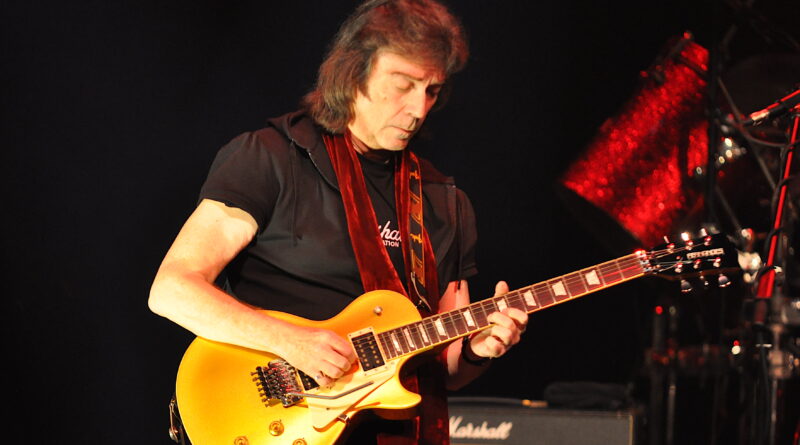According to Steve Hackett, the guitar has some advantages over the piano as a musical instrument in terms of expressive qualities. Talking to “Now Spinning Magazine with Phil Aston,” Hackett said that he’s still a fan of the piano and that it “can sound absolutely wonderful,” but that our favorite 6-string instrument is more appealing for a few reasons.
The topic came up while Hackett was discussing his classical influences. The interviewer mentioned how his contemporaries — like Ritchie Blackmore, Tony Iommi, Jimmy Page, and David Gilmour — were all very blues-based. Meanwhile, Hackett, along with Robert Fripp and Steve Howe, was more inspired by classical music. Asked if this was a huge influence on him from the beginning, he replied:
“And it still is today. You know, when you think of the marvelous, Rachmaninoff-like convolutions that keyboard players are capable of, you look at the guitar, the humble guitar, and you try and fool people into thinking it’s a limitless instrument in terms of range.”
Among many influences was also Andrés Segovia — a classical guitar master who’s well-known for his arrangement of J.S. Bach’s pieces:
“I’d be thinking about the nylon guitar here right now, but, you see, what I was amazed about was hearing Segovia playing things that in the early days, those things that were recorded with precious little bottom and top — it could have been a keyboard.”
“They sounded — especially those Bach pieces — [like] keyboard-brain behind stuff that might have been written originally for violin or cello and transcribed for guitar. [It] seemed miraculous to me.”
At the same time, despite being a “keyboard-brain” kind of music, you could still hear some of the classical guitar qualities in there:
“And they do really get the guitar ringing from bottom to top in the hands of a good player on a good night. So that has always informed not just my acoustic playing, but if I want to search for harmonies, it won’t usually be with an electric guitar around my neck.”
Of course, Hackett is playing both nylon-string guitars, as well as the usual electric guitars. Explaining how he chooses what’s best for a given setting, he offered:
“I’ll be playing single line in the main with electric — doing the equivalent of a burn-up on a bike on it — but if I’m looking for harmonies, I’ll be using the nylon guitar.”
“So it’s been a lifelong passion for me, and I suspect for Steve Howe, too — of course, we worked together with GTR briefly in the 1980s. Robert [Fripp], of course, was coming very much from the left field with jazz ideas, and I think it made for an interesting collection of our respective bands.”
Hackett still praised blues music despite his background gravitating more towards the classical-oriented stuff. After all, the genre is the foundation of all the subgenres and movements within rock music:
“Well, I think you could tell that there was something outside blues going on. There’s nothing wrong with blues — for it’s supposed to be able to convey raw emotion — so I won’t hear a word against blues, no matter what its detractors say.”
But as Hackett adds, having something like classical music in your vocabulary, or simply as an inspiration, can only help you in creating original music:
“But in the wider world outside what blues is capable of doing, of course, you’ve got these wonderful melodies that exist in the world of classical music. It tends to come together in the hands of — or in the brain of — [Joaquín] Rodrigo [Spanish composer and virtuoso pianist], who didn’t play guitar, but ‘Concierto de Aranjuez’ was this famous piece for orchestra and nylon guitar popularized originally by Miles Davis doing a version of it for brass, known as ‘Sketches of Spain’ — he apparently popularized the thing. And now you’ll hear it pretty much every day on a radio station or other.”
“I remember, in the heyday of listening to Classic FM, I’m sure that I heard four different versions of ‘Concierto de Aranjuez’ during one particular day because it seemed absolutely right for what they were trying to do with the crossover market, all that sort of stuff.”
Discussing the matter, Hackett then explained why he thinks the guitar ended up as a more popular instrument than the piano in rock music:
“So perhaps guitar was more ‘salty’ for people to listen to, a little less dodgy than piano, although piano can sound absolutely wonderful. But the difference is that perhaps the lighter touch of the guitar is something that, I guess, goes back to the idea of the romantic troubadour trying to win the affections of his chosen lady and the sort of bleeding quality of that.”
“So there’s always been a romance attached to the guitar, whereas the piano has this solitary feeling about it by comparison — you think of Chopin, and one gets the impression that his main relationship was with his instrument, rather than with any one particular person. So it all seemed to get brought into it, which is why it’s such an emotional, beautiful music and so influential today.”
Photo: Clender (Steve Hackett – Parker Playhouse – 13662984704)


